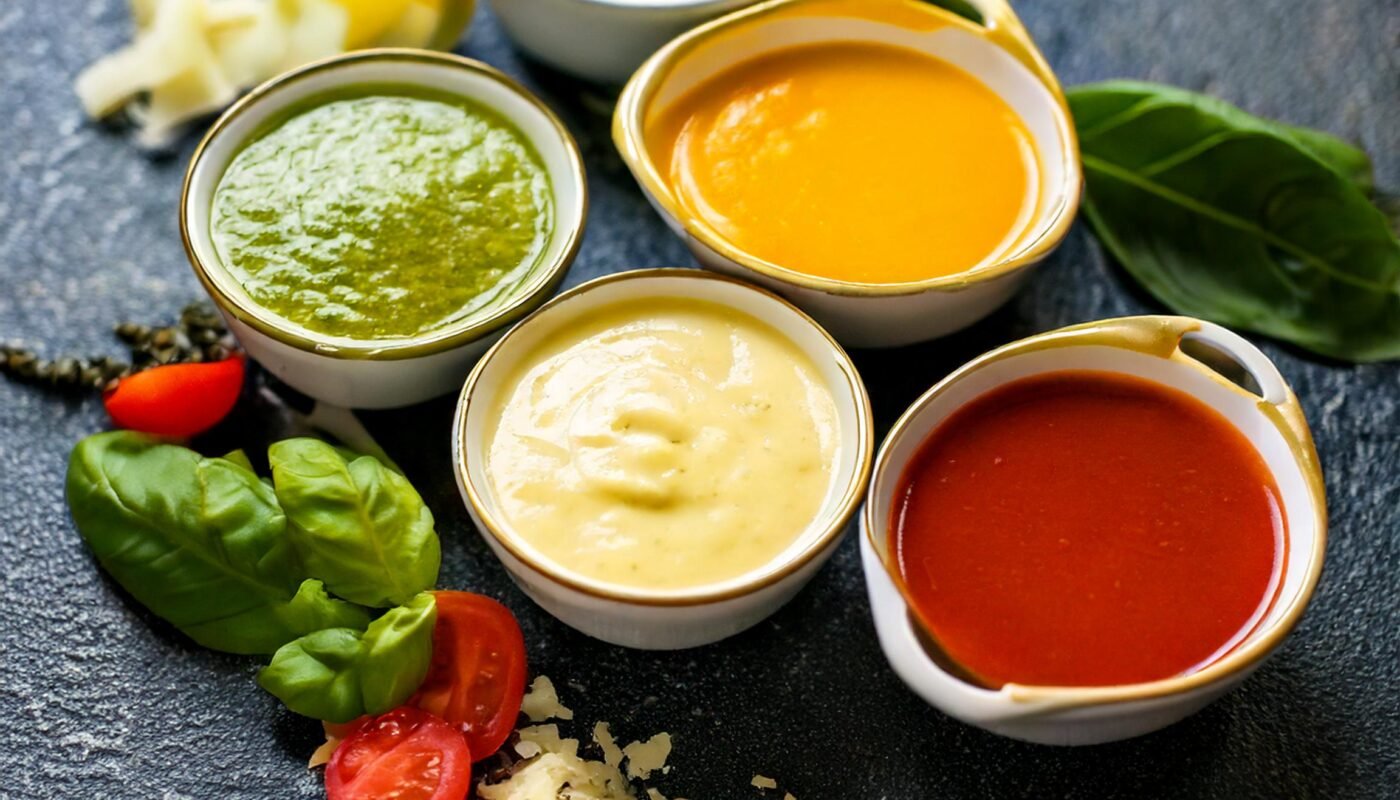Discover the art of sauce-making with these five easy yet transformative recipes—your gateway to flavorful dishes, from weeknight staples to elegant dinners.
A Splash of Flavor – The Secret Power of Sauces
Ever wonder what takes an ordinary dish and makes it restaurant-level good? The answer often lies in the sauce. Learning to master a few essential sauces opens up a world of creativity for any home cook. From the creamy richness of Béchamel to the zing of vinaigrette, these sauces act as the foundation for some of the world’s favorite dishes. Here’s a look at five must-know recipes that every aspiring chef should add to their culinary toolkit.
Béchamel: The Silky Backbone of Comfort Foods
Nothing says comfort quite like a creamy, dreamy Béchamel sauce. As one of the “mother sauces” of French cuisine, Béchamel makes its way into beloved favorites like lasagna, mac and cheese, gratins, and croque monsieur.
Béchamel (White Sauce)
- Uses: Lasagna, mac and cheese, gratins, croque monsieur
- Ingredients:
- 2 tbsp butter
- 2 tbsp flour
- 2 cups milk
- Salt, pepper, and a pinch of nutmeg
Instructions:
Melt butter over medium heat, then whisk in flour to form a roux. Cook for about 1 minute, then gradually whisk in warm milk. Stir constantly until the sauce thickens. Season with salt, pepper, and nutmeg.
The key to a smooth Béchamel lies in mastering the roux—equal parts butter and flour cooked to remove any raw taste. Gradually whisking in warm milk ensures the sauce thickens to perfection. With a pinch of nutmeg, it turns into the creamy foundation for an array of hearty dishes that will warm your soul.
Marinara Sauce: A Tomato Lover’s Dream
Few sauces are as versatile and crowd-pleasing as a well-made Marinara sauce. This simple blend of olive oil, garlic, and crushed tomatoes is the heartbeat of Italian cooking. Whether tossed with pasta, slathered on pizza, or spooned over chicken Parmesan, this sauce delivers comfort in every bite.
Marinara Sauce
- Uses: Pasta, pizza, chicken Parmesan, dipping sauce for bread
- Ingredients:
- 2 tbsp olive oil
- 3 garlic cloves, minced
- 1 can (28 oz) crushed tomatoes
- 1 tsp sugar (optional)
- Salt, pepper, and fresh basil
Instructions:
Heat olive oil and sauté garlic until fragrant. Add crushed tomatoes, salt, and pepper. Simmer for 20-30 minutes. Add sugar if needed to balance acidity, and stir in fresh basil before serving.
A tip from seasoned chefs: fresh basil at the end brings out the vibrant flavors, and a spoonful of sugar helps mellow out any harsh acidity from the tomatoes. Marinara sauce is proof that even the humblest ingredients can create magic when cooked with care.
Hollandaise: Breakfast Just Got Fancy
Brunch lovers know the transformative power of Hollandaise sauce. Velvety, buttery, and slightly tangy from a touch of lemon, Hollandaise elevates eggs Benedict, grilled asparagus, and roasted fish into gourmet dishes.
Hollandaise Sauce
- Uses: Eggs Benedict, asparagus, roasted vegetables, fish
- Ingredients:
- 3 egg yolks
- 1 tbsp lemon juice
- ½ cup melted butter
- Salt and cayenne pepper
Instructions:
Whisk egg yolks and lemon juice over a double boiler until thick. Slowly drizzle in melted butter while whisking continuously. Season with salt and cayenne pepper. Serve immediately.
The trick to perfect Hollandaise lies in patience. Slowly whisking melted butter into egg yolks over a double boiler keeps the mixture from curdling. While it may take some practice, the result is a sauce that makes breakfast feel indulgent enough to be dinner.
Pesto Sauce: The Taste of Summer
Nothing captures the essence of summer quite like the vibrant green of Pesto sauce. Originating from Italy, pesto is a raw sauce made with fresh basil, pine nuts, garlic, olive oil, and Parmesan. Its simplicity makes it endlessly versatile—toss it with pasta, spread it on sandwiches, or drizzle it over grilled chicken.
Pesto Sauce
- Uses: Pasta, sandwiches, chicken, vegetables
- Ingredients:
- 2 cups fresh basil leaves
- ¼ cup pine nuts
- 2 garlic cloves
- ½ cup olive oil
- ½ cup grated Parmesan
- Salt and pepper
Instructions:
Blend basil, pine nuts, and garlic in a food processor. Slowly add olive oil while processing. Stir in Parmesan, and season with salt and pepper to taste.
Homemade pesto allows you to control every element, from the garlic punch to the nutty richness. A food processor makes preparation easy, and the smell of fresh basil in your kitchen will transport you straight to the Mediterranean coast.
Vinaigrette: Elevate Your Salads
Don’t underestimate the power of a well-made vinaigrette. With just a few ingredients—vinegar, olive oil, Dijon mustard, garlic, salt, and pepper—you can transform a simple salad into a flavorful masterpiece.
Vinaigrette
- Uses: Salads, marinades, roasted vegetables
- Ingredients:
- 1 part vinegar (such as red wine or balsamic)
- 3 parts olive oil
- 1 tsp Dijon mustard
- 1 garlic clove, minced
- Salt and pepper
Instructions:
Whisk together vinegar, mustard, garlic, salt, and pepper. Slowly drizzle in olive oil while whisking to emulsify. Adjust seasoning as needed.
The key to a successful vinaigrette lies in the emulsification process: slowly whisking olive oil into the vinegar-mustard mixture until it comes together as a smooth dressing. This adaptable sauce works not only on greens but also as a marinade for meats and roasted vegetables. Play with flavors by trying balsamic vinegar, lemon juice, or honey to suit your dish.
Your Turn – Think This is Yummy? Or Hate it? – We Want to Hear from You
Please offer an insightful and thoughtful comment. Idiotic, profane, or threatening comments are eliminated without remorse. Consider sharing this story. Follow us to have other feature stories fill up your Newsbreak feed from ThumbWind Publications.
Check Out Our Other Popular Culinary Features
- Is A.1. Buttering Us Up? New Product Dips Into Steakhouse Game
- The Secret Behind Red Hot Dogs – Fascinating Story of Why They’re Red
- 5 Best Cuban Sandwich Tampa – Flavorful Trek Of Rich History
Explore the best of food and drink on Spice2Vice.com.




